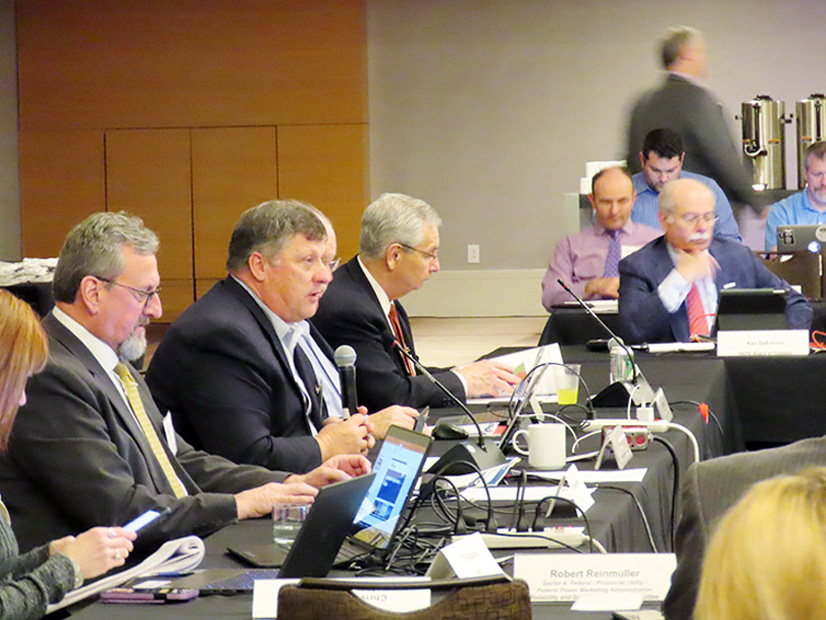
First New Member Class Joins Committee
NERC’s Reliability and Security Technical Committee (RSTC) marked a key moment of growth this week, welcoming its first new class of members since the committee’s founding two years ago.
The committee’s initial set of 22 sector representatives and 10 at-large members, plus the chair and vice chair, took their seats at their first meeting in March 2020. (See RSTC Tackles Organization Issues in First Meeting.) The plan was for the members to serve staggered terms of two years each, with half the initial slate to leave in 2022 and the rest departing in 2023.
Nominations for new sector representatives ran from October to November, while at-large nominations were received in December. Each sector selected one delegate except for Sector 7, representing electricity marketers; for this sector two representatives were needed: one for the regular term beginning this year, and the other to replace a retiring member whose term ends next year.
NERC’s Board of Trustees approved the committee’s new membership in February, except for Greg McCauley of Sector 3 (Cooperative Utilities), who was chosen in a special election earlier this month after the resignation of Marc Child of Great River Energy. McCauley, who did not attend this week’s meeting, is expected to be approved at the board’s next meeting in May.
RSTC Chair Greg Ford of Georgia System Operations thanked the incoming representatives as well as the outgoing slate, whom he called the “founding members … who have really worked very hard to bring the RSTC where we are today.”
Among the departing members is ERCOT’s Christine Hasha, a member of the RSTC’s six-person Executive Committee. Members approved the appointment of Christine Ericson of the Illinois Commerce Commission to replace Hasha.
IRPWG Elevated to Subcommittee
The RSTC’s Inverter-based Resources Performance Working Group (IRPWG) will be promoted to a subcommittee following the recommendation of the committee’s Sunset Review Team, which is mandated by the RSTC charter to review each working group every year and determine if their scope needs to be revised, expanded or ended.
The IRPWG, originally called the Inverter-based Resources Performance Task Force, was created under the Planning Committee to “explore the performance characteristics of utility-scale inverter-based resources [IBRs] … directly connected to the bulk power system.” Its remit includes researching the extent of penetration of IBRs in the bulk power system, as well as producing reliability guidelines and standard authorization requests for potential IBR-related reliability standards.
Robert Reinmuller of Hydro One, in his presentation on the Sunset Review Team’s recommendations, said that given the accelerating transition of the grid to renewable energy sources and the “quite considerable” work planned by the IRPWG, raising the profile of the group by making it a full subcommittee would help it meet its goals.
“The next several years will be critical in the adoption and integration of these resources and making sure that we’re tracking performance [and] we have proper guidelines, standards and so on,” Reinmuller said.
The RSTC’s other working groups will continue in their current form, per the team’s recommendation.
New Guidelines Approved
Other approvals in this week’s meeting included two reliability guidelines, which unlike reliability standards are nonbinding and strictly voluntary. The first, submitted by the Resources Subcommittee, concerns accounting practices to address inadvertent interchange and “provide a method for isolating and eliminating the source(s) of accounting errors.” A draft version of the guideline is already present on NERC’s Reliability and Security Guidelines webpage; the new version adds language regarding the development of metrics.
The second guideline, “DER Forecasting Practices and Relationship to DER Modeling for BPS Planning Studies,” was submitted by the System Planning Impacts of Distributed Energy Resources (SPIDER) Working Group. Like the subcommittee’s guideline, SPIDER’s document modifies the draft version on NERC’s website to add new metrics for use by industry.
Both guidelines have been through the industry commenting process; the revisions are based on the comments received. Having received the RSTC’s approval, they will now be posted to NERC’s website.



